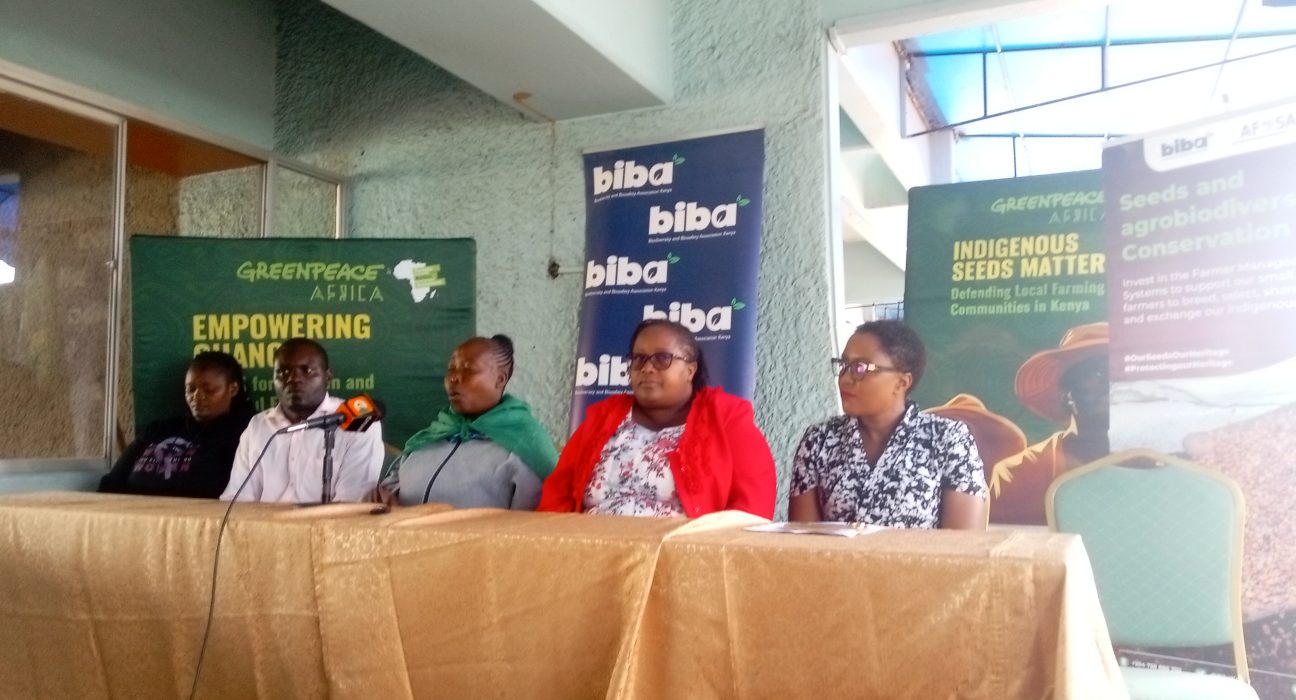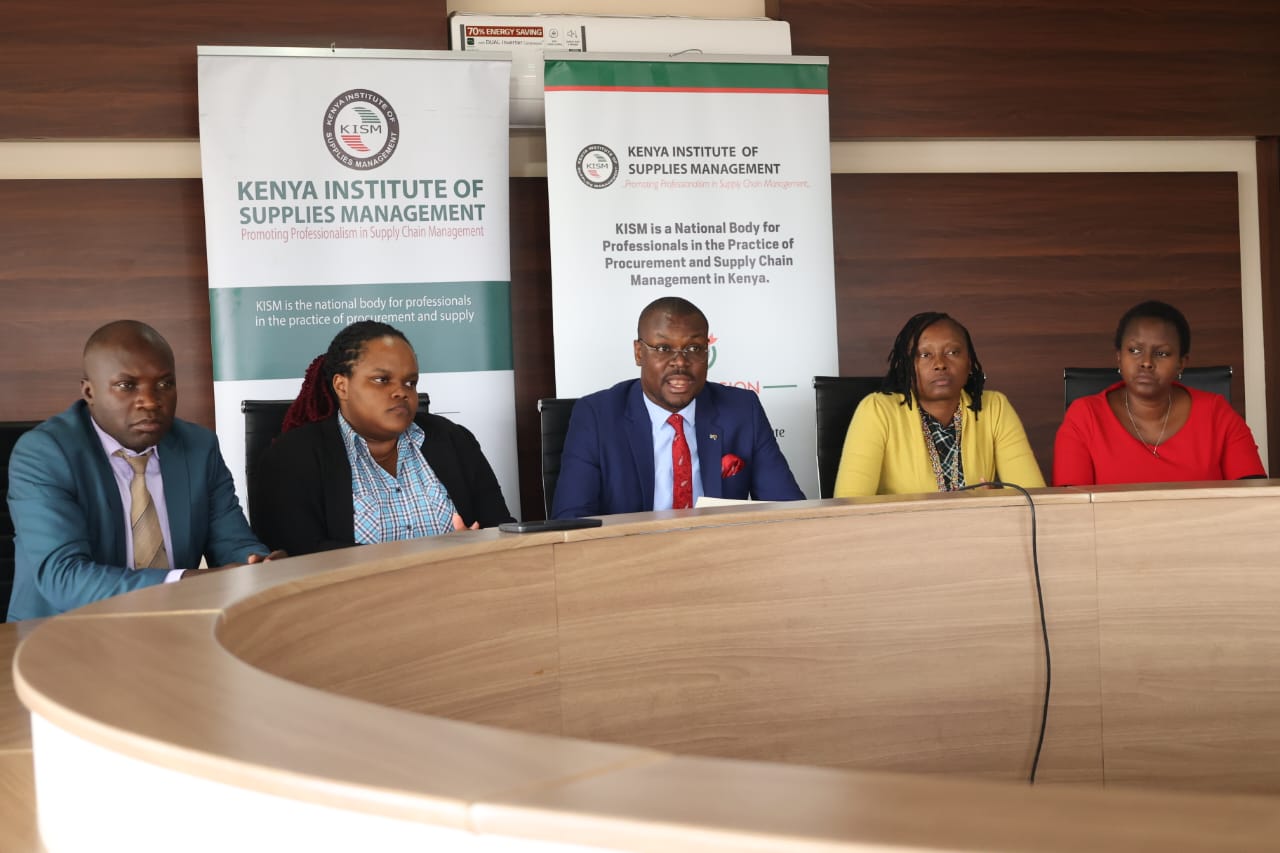By Eddah Waithaka
In a historic victory for farmers and food sovereignty advocates, the Court of Appeal has temporarily halted the importation of genetically modified (GM) crops into Kenya.
The decision, celebrated by Greenpeace Africa, the Kenya Peasants League, and the Biodiversity and Biosafety Association of Kenya (BIBA Kenya), marks a critical moment in the fight for farmer-managed seed systems and sets the stage for a pivotal seed litigation case in May.
At a joint press conference held at Chester House today, representatives from the three organizations hailed the ruling as a significant step forward but warned that the battle for seed sovereignty is far from over.
A Step in the Right Direction
Elizabeth Atieno, Food Campaigner at Greenpeace Africa, addressed the media, emphasizing the importance of the ruling while cautioning against complacency.
“The recent GMO ruling was a step in the right direction. But this victory is just the beginning,” she said. “The real test is ahead of us.” Atieno highlighted the upcoming seed litigation as a decisive moment for Kenya’s agricultural future.
She warned that if corporations succeed in locking farmers into seed patents and restrictive laws, they will dictate what farmers plant, how they grow it, and who profits from it.
“Farmers will no longer have the right to save, share, or exchange seeds, something they have done for generations.”
She stressed that the fight is not against progress or innovation but against systems that prioritize corporate profit over people.
Read More On: https://africawatchnews.co.ke/kenya-set-to-launch-ambitious-10-year-national-irrigation-sector-investment-plan-nisip-tomorrow/
“True agricultural progress means strengthening what already works, not replacing it with a system that creates dependency, increases costs for farmers, and concentrates control over seeds in the hands of a few companies,” Atieno asserted.
“GMOs Are Not About Feeding Kenya, But Controlling Kenya” Ann Maina, National Coordinator of BIBA Kenya, echoed these sentiments, describing the ruling as a hard-won victory that reaffirmed Kenya’s commitment to protecting its food systems.
She declared that the recent GMO ruling was a moment when Kenya stood up and said, “No. We will not let our food system be hijacked.”
Maina criticized the narrative that GMOs are a solution to hunger, arguing that they instead create dependency and environmental harm.
“GMOs are presented as a quick-fix solution to hunger, but in reality, they create more problems than they claim to solve,” she said.
“They come with a reliance on chemical pesticides and fertilizers, creating a cycle where farmers must continuously invest in costly inputs to maintain yields.”
She also condemned breeders’ protection rights under agreements like UPOV 91, which criminalize farmers for saving and replanting seeds.
“These laws are not designed to protect farmers,” Maina said. “They are designed to protect corporate profits.”
Farmers as custodians of Seed and Food Systems
A representative from the Kenya Peasants League emphasized the critical role farmers play in preserving seed diversity and food sovereignty.
“We are the custodians of seeds and food systems,” the farmer said. “If these laws criminalize our right to save and exchange seeds, they will force us into permanent dependency on multinational corporations.”
The farmer highlighted the resilience and cultural significance of farmer-managed seed systems, which are cost-effective, climate-resilient, and deeply rooted in local traditions. They urged that we must recognize and protect farmer-managed seed systems.
A Sustainable Alternative
The press conference underscored agroecology as a viable and farmer-centered alternative to GMOs. Advocates emphasized its potential to promote biodiversity, restore soil health, and enhance climate resilience while safeguarding farmers’ rights to seed sovereignty.
Stakeholders called for unified action from farmers, civil society, and policymakers ahead of the May litigation.
They urged the public to stand in solidarity with farmers and pressure policymakers to prioritize the interests of the people over corporate profits.
The upcoming seed litigation case has far-reaching implications, not only for Kenya but for the entire African continent. A victory could set a regional precedent, influencing food sovereignty policies across Africa and reinforcing the rights of farmers to control their seeds and food systems.
“The future of our food, our biodiversity, and our independence is at stake.” Elizabeth Atieno concluded, “Let us act now, for if we lose these rights, we may never get them back.”
Read More Stories At : https://africawatchnews.co.ke/







